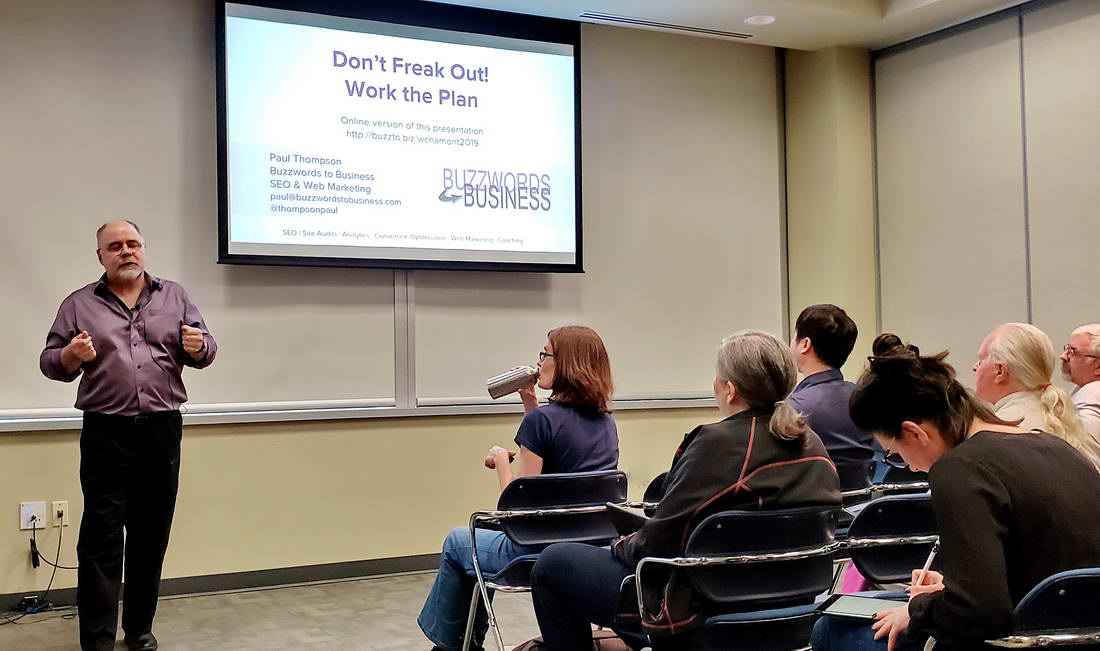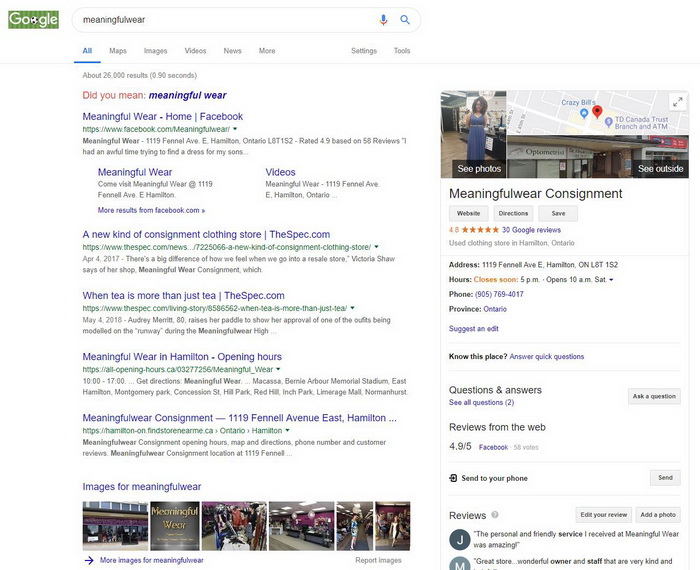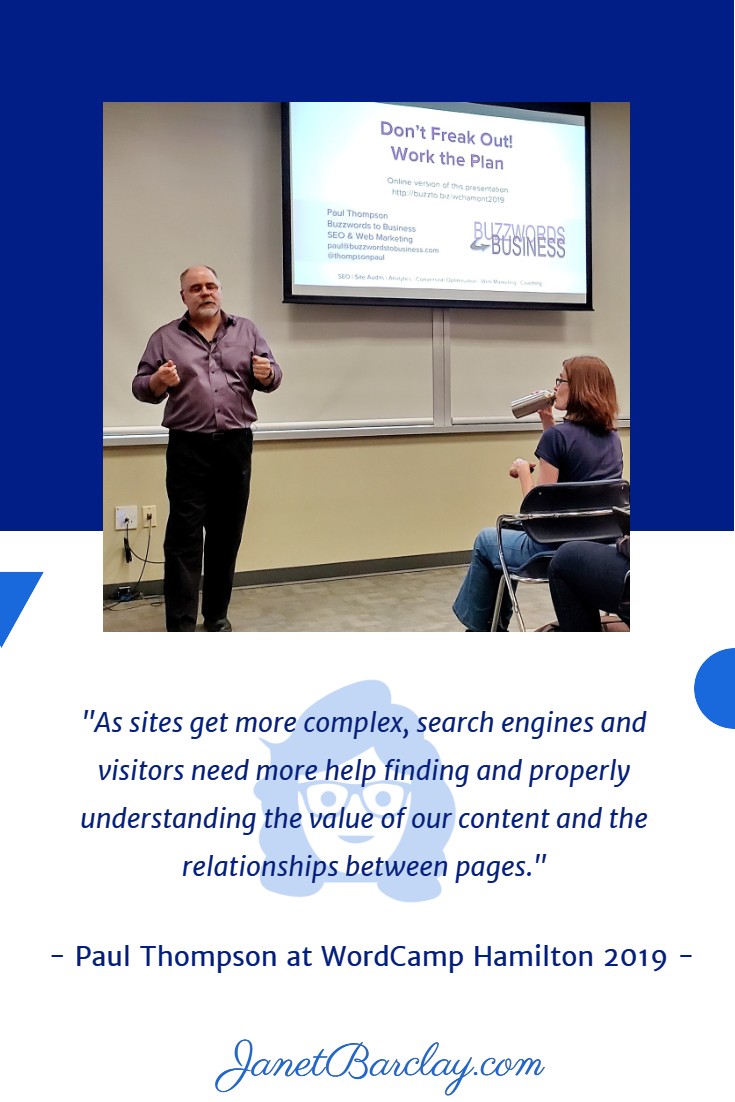SEO Strategies for 2019

This page may contain links to Amazon.com or other sites from which I may receive commission on purchases you make after clicking on such links. Read my full Disclosure Policy
If you read my latest newsletter, you already know that my favorite session at WordCamp Hamilton 2019 was SEO is Evolving Faster Than Ever. How to survive and take advantage of all the recent changes.
Paul Thompson shared so much valuable information in his 45-minute presentation that I decided to supplement it with my own research and post the highlights here on my blog. Now you too can learn what really matters today when it comes to search engine optimization!
Mobile First Indexing
When people started using smartphones, it became important to have a mobile-friendly website. You may have decided not to worry about it if your analytics show that the majority of visitors access your site on a desktop computer – but did you ever consider that those numbers might shift if your site was more usable on mobile devices?
From an SEO perspective, if you don’t have a responsive website, it’s going to hurt you in the search results. Google has been experimenting with Mobile First Indexing for a few years now, but as of July 1, all new sites will be indexed based on how they work on mobile.
One of the factors you should pay attention to is site speed, specifically on mobile. The speed difference between the mobile and desktop versions of your website can be significant, and this is definitely something I need to work on for this site.
Voice Search & Voice Results
Most of us have used voice search, whether Siri, Google Assistant, Cortana, or some other tool. Basically, it involves saying what we’re searching for instead of typing it into a search engine. But have we thought about how this trend might affect our websites?
Think about when you do a voice search as opposed to when you enter search terms online. You’re much more likely to ask a question like “Where’s the closest Italian restaurant?” than to say “Italian restaurant Hamilton.”
With that in mind, it will serve you well to consider the questions people at various stages of the buying journey might ask and make sure you answer them on your website, possibly in your FAQ section. Formatting your answers with subheadings, tables and bullet points will help Google understand them better than big blocks of text, which will in turn allow them to send you relevant traffic.
I found a great article on Search Engine Journal that covers this in more detail: Voice Search Optimization: 6 Big Changes You’ll Need to Make
On devices such as Amazon Alexa and Google Home, instead of a page of results to choose from, only one search result is provided. This isn’t something we should be worrying about just yet, but it will become more important as more people adopt this technology.
Content Quality
For several years now, Google has been focusing on high quality content. This isn’t new, so if you’re still stuffing your blog posts with “SEO keywords” and don’t understand why your traffic is down, it’s time to wake up and smell the coffee.
You may be wondering how Google distinguishes high quality content from filler. Believe it or not, Web Search Evaluator is an actual job! You can read Google’s Search Quality Evaluator Guidelines (all 168 pages of them) online.
While you’re reviewing your content to make sure it answers common questions, keep an eye open for information that’s weak, out of date, no longer relevant, or duplicated on your site, and decide whether to update, improve, delete or redirect it, or to just tell Google not to index that particular page.
How to discover what concepts people are searching for
Search is no longer about keywords, but about concepts. Most searches these days are at least four words long.
I’ve curated some of Paul’s slides showing a number of ways we can explore opportunities to provide the information our potential clients or customers are searching for.
Site Architecture
Paul explained the importance of communicating the value of our content to the search engines:
One way we can communicate what our content is about is through internal links, making related topics cooperate with one another instead of competing. Creating hubs, silos and topic areas is a great way to achieve this. (Great job, Hazel!)
Although in the past we were told to keep our permalinks clean (e.g. example.com/post-name), it’s now recommended that we include categories and subcategories (e.g. example.com/main-topic/subtopic/post-name) in order to help search engines and users understand the hierarchy and relationship between pages.
Local Search Optimization
While doing searches, you’ve probably noticed results like this one:

Google displays the results in such a way that most people can get the information they’re looking for without even clicking on anything. We’ve got location, hours of operation, phone number, and reviews, all at our fingertips.
Before you get annoyed that potential clients aren’t seeing your beautiful website, remember that the easier it is for them to contact you, the better! And if they can clearly see when you’re open, you won’t have to deal with people calling to ask for that information.
Bottom line, you need to have a Google My Business Page if geographic proximity is an important factor for your business. Optimize it by soliciting reviews, adjusting your service area if applicable, and using all 750 available characters in your business description.
3 SEO Action Steps
- Use a mobile-focused tool such as Google PageSpeed Insights or Lighthouse Audits to test your site speed and learn how you can improve its performance.
- Optimize your content for the longer, more conversational questions typically used in voice searches.
- Create a process for regularly improving, updating or removing existing content.
You’ll find more action steps, further details, and additional resources in the full slide deck for this presentation.

Janet Barclay
I eliminate stress for my clients by hosting, monitoring, and maintaining their WordPress sites so they don’t have to worry about security, downtime or performance issues. When I’m away from my desk, I enjoy reading, photography, cooking, watching movies, drinking tea, and spending time with my family.




